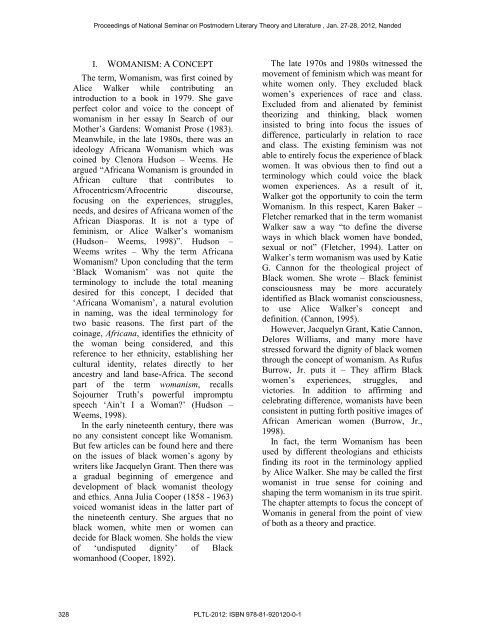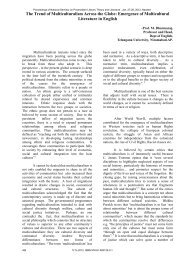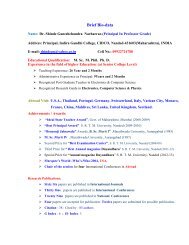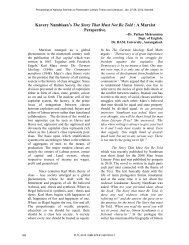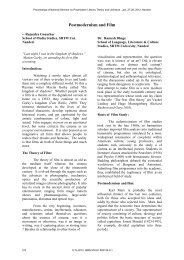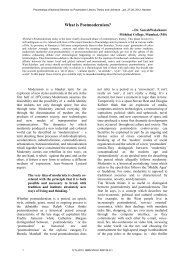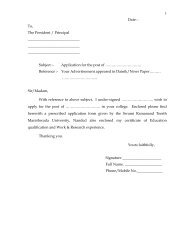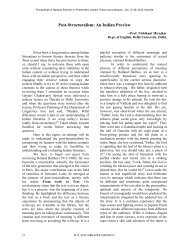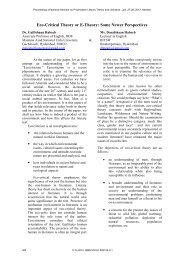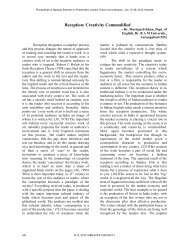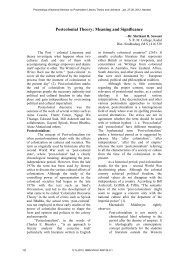Postcolonial Feminist Theory: An Overview - Igcollege.org
Postcolonial Feminist Theory: An Overview - Igcollege.org
Postcolonial Feminist Theory: An Overview - Igcollege.org
You also want an ePaper? Increase the reach of your titles
YUMPU automatically turns print PDFs into web optimized ePapers that Google loves.
Proceedings of National Seminar on Postmodern Literary <strong>Theory</strong> and Literature , Jan. 27-28, 2012, NandedI. WOMANISM: A CONCEPTThe term, Womanism, was first coined byAlice Walker while contributing anintroduction to a book in 1979. She gaveperfect color and voice to the concept ofwomanism in her essay In Search of ourMother’s Gardens: Womanist Prose (1983).Meanwhile, in the late 1980s, there was anideology Africana Womanism which wascoined by Clenora Hudson – Weems. Heargued “Africana Womanism is grounded inAfrican culture that contributes toAfrocentricsm/Afrocentric discourse,focusing on the experiences, struggles,needs, and desires of Africana women of theAfrican Diasporas. It is not a type offeminism, or Alice Walker’s womanism(Hudson– Weems, 1998)”. Hudson –Weems writes – Why the term AfricanaWomanism? Upon concluding that the term‘Black Womanism’ was not quite theterminology to include the total meaningdesired for this concept, I decided that‘Africana Womanism’, a natural evolutionin naming, was the ideal terminology fortwo basic reasons. The first part of thecoinage, Africana, identifies the ethnicity ofthe woman being considered, and thisreference to her ethnicity, establishing hercultural identity, relates directly to herancestry and land base-Africa. The secondpart of the term womanism, recallsSojourner Truth’s powerful impromptuspeech ‘Ain’t I a Woman?’ (Hudson –Weems, 1998).In the early nineteenth century, there wasno any consistent concept like Womanism.But few articles can be found here and thereon the issues of black women’s agony bywriters like Jacquelyn Grant. Then there wasa gradual beginning of emergence anddevelopment of black womanist theologyand ethics. <strong>An</strong>na Julia Cooper (1858 - 1963)voiced womanist ideas in the latter part ofthe nineteenth century. She argues that noblack women, white men or women candecide for Black women. She holds the viewof ‘undisputed dignity’ of Blackwomanhood (Cooper, 1892).The late 1970s and 1980s witnessed themovement of feminism which was meant forwhite women only. They excluded blackwomen’s experiences of race and class.Excluded from and alienated by feministtheorizing and thinking, black womeninsisted to bring into focus the issues ofdifference, particularly in relation to raceand class. The existing feminism was notable to entirely focus the experience of blackwomen. It was obvious then to find out aterminology which could voice the blackwomen experiences. As a result of it,Walker got the opportunity to coin the termWomanism. In this respect, Karen Baker –Fletcher remarked that in the term womanistWalker saw a way “to define the diverseways in which black women have bonded,sexual or not” (Fletcher, 1994). Latter onWalker’s term womanism was used by KatieG. Cannon for the theological project ofBlack women. She wrote – Black feministconsciousness may be more accuratelyidentified as Black womanist consciousness,to use Alice Walker’s concept anddefinition. (Cannon, 1995).However, Jacquelyn Grant, Katie Cannon,Delores Williams, and many more havestressed forward the dignity of black womenthrough the concept of womanism. As RufusBurrow, Jr. puts it – They affirm Blackwomen’s experiences, struggles, andvictories. In addition to affirming andcelebrating difference, womanists have beenconsistent in putting forth positive images ofAfrican American women (Burrow, Jr.,1998).In fact, the term Womanism has beenused by different theologians and ethicistsfinding its root in the terminology appliedby Alice Walker. She may be called the firstwomanist in true sense for coining andshaping the term womanism in its true spirit.The chapter attempts to focus the concept ofWomanis in general from the point of viewof both as a theory and practice.328 PLTL-2012: ISBN 978-81-920120-0-1


